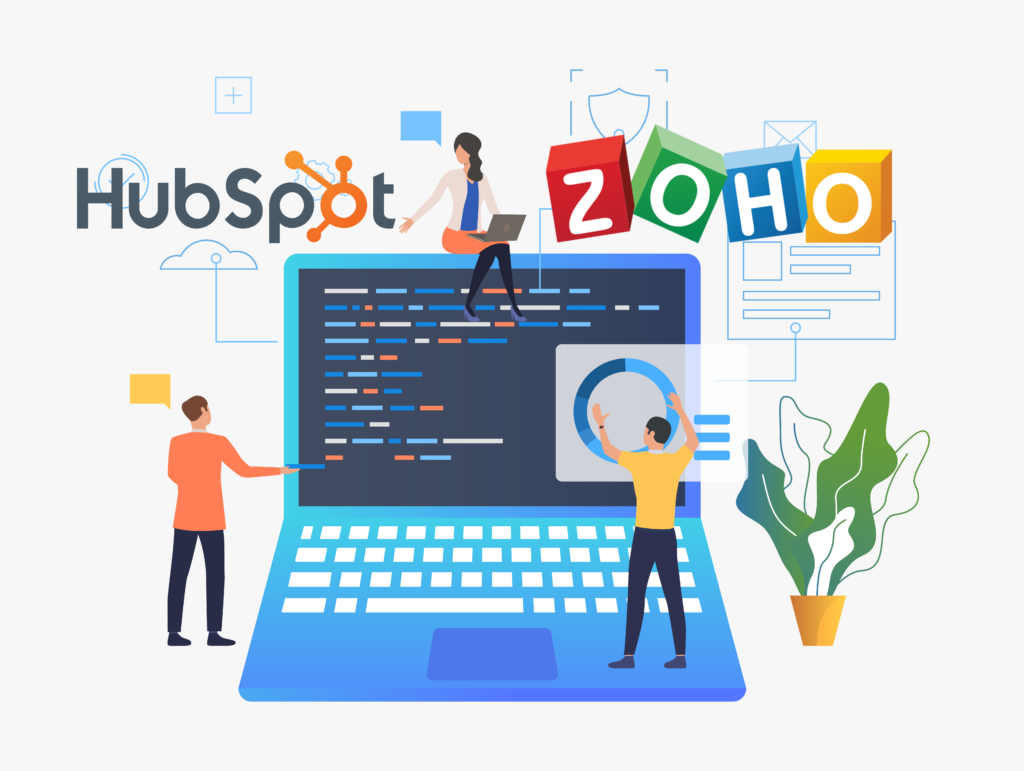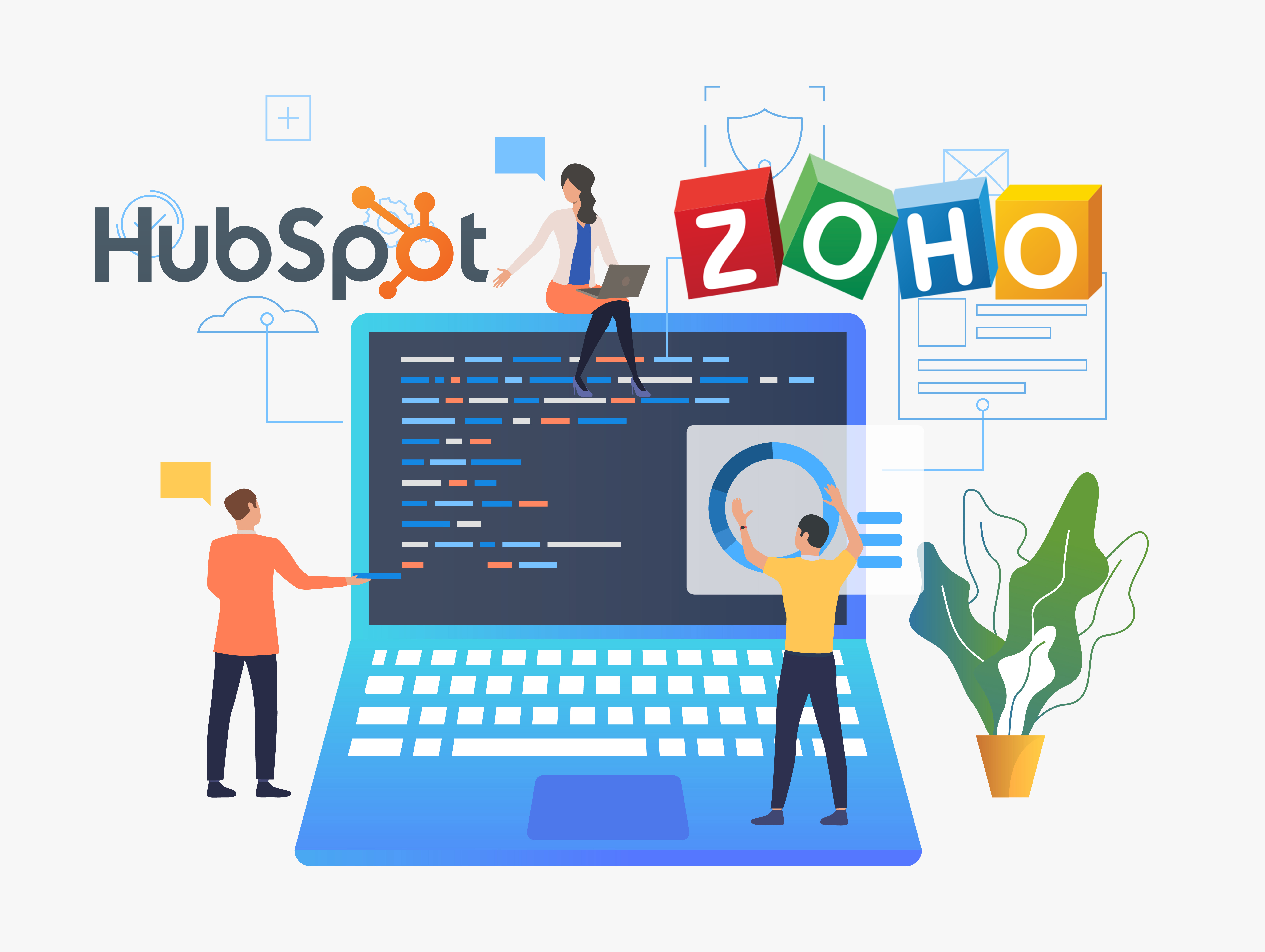In the world of customer relationship management (CRM) software, HubSpot and Zoho are two of the biggest names in the market. Both platforms offer robust features to help businesses manage their sales and marketing efforts. In this article, we’ll take a closer look at HubSpot vs Zoho CRM to help you determine which platform might be right for your business.

HubSpot vs Zoho CRM: Pricing
One of the first things to consider when comparing HubSpot vs Zoho CRM is pricing. Both platforms offer free versions of their CRM software, but they differ in terms of the features and limitations of these free plans.
HubSpot’s free CRM is robust and includes features like contact management, deal tracking, and email marketing. However, it does have some limitations, such as a cap on the number of users and limited reporting capabilities. HubSpot also offers paid plans starting at $50 per month per user, which offer additional features such as custom fields and reporting, sales automation, and more.
Zoho CRM’s free plan is more limited than HubSpot’s, offering only basic features such as contact management and lead tracking. However, Zoho’s paid plans start at a lower price point than HubSpot’s, with plans starting at $12 per month per user. Zoho’s paid plans also offer more features than HubSpot’s paid plans at similar price points, such as advanced analytics and inventory management.
HubSpot vs Zoho CRM: Features
When it comes to features, both HubSpot and Zoho CRM offer a wide range of tools to help businesses manage their sales and marketing efforts. However, there are some key differences to consider.
HubSpot’s CRM offers features such as:
Contact management
Deal tracking
Email marketing
Sales automation
Custom fields
Reporting and analytics
HubSpot also offers additional tools such as marketing automation and customer service software, which can be integrated with the CRM to provide a more complete solution for businesses.
Zoho CRM offers features such as:
Contact management
Lead and deal tracking
Sales forecasting
Inventory management
Advanced analytics
Workflow automation
Zoho also offers a wide range of additional tools that can be integrated with the CRM, such as project management software, social media management, and more.
HubSpot vs Zoho CRM: Ease of Use
Another important factor to consider when comparing HubSpot vs Zoho CRM is ease of use. Both platforms are designed to be user-friendly and easy to navigate, but there are some differences to consider.
HubSpot’s CRM is known for its simple and intuitive interface, making it easy for even novice users to get started. HubSpot also offers extensive training and support resources, such as a knowledge base, online courses, and a community forum.
Zoho CRM can be more complex to navigate than HubSpot’s CRM, especially for users who are not familiar with CRM software. However, Zoho offers extensive documentation and support resources, including a knowledge base, user forums, and video tutorials.
HubSpot vs Zoho CRM: Integrations
Integrations are an important consideration when choosing a CRM platform, as they allow businesses to connect their CRM with other tools and software they use. Both HubSpot and Zoho CRM offer a wide range of integrations, but there are some differences to consider.
HubSpot offers integrations with over 500 tools and software, including popular marketing and sales tools like Salesforce, Google Analytics, and Facebook Ads. HubSpot also offers an open API, which allows businesses to build custom integrations with their own tools and software.
Zoho CRM offers integrations with over 300 tools and software, including popular accounting and project management software like QuickBooks and Trello. Zoho also offers an open API, which allows businesses to build custom integrations with their own tools and software.
HubSpot vs Zoho CRM: Customer Support
Finally, it’s important to consider the level of customer support offered by each platform. Both HubSpot and Zoho CRM offer extensive support resources, but there are some differences to consider.
HubSpot offers support through email, phone, and live chat, as well as a community forum and a knowledge base. HubSpot also offers a customer success program for paid users, which includes a dedicated account manager and personalized training.
Zoho CRM offers support through email, phone, and live chat, as well as a knowledge base and user forums. Zoho also offers a customer success program for paid users, which includes a dedicated account manager and personalized training.
HubSpot vs Zoho CRM: Which is Right for Your Business?
When comparing HubSpot vs Zoho CRM, there are a number of factors to consider, including pricing, features, ease of use, integrations, and customer support. Ultimately, the best CRM platform for your business will depend on your specific needs and preferences.
If you’re looking for a user-friendly CRM with robust marketing and sales automation features, HubSpot may be the best choice for your business. However, if you’re looking for a more affordable option with advanced analytics and inventory management capabilities, Zoho CRM may be a better fit.
It’s important to consider your business’s specific needs and goals when choosing a CRM platform. Take the time to evaluate the features and capabilities of each platform, and consider factors like pricing, integrations, and customer support to make an informed decision. With the right CRM in place, you can streamline your sales and marketing efforts and improve your overall business performance.
Other Alternative
Simply CRM is a cloud-based customer relationship management (CRM) software that is designed to help businesses manage their customer relationships and sales processes. It offers a range of features and tools that can help businesses streamline their sales processes, track customer interactions, and improve customer engagement.
One of the key features of Simply CRM is its contact management tools. The software allows businesses to store all of their customer information in one central location, making it easy to access and update customer records as needed. Businesses can also segment their customer database based on various criteria, such as demographics, purchase history, and engagement level, allowing them to target specific groups with personalized marketing campaigns.
Simply CRM also offers sales pipeline management tools that allow businesses to track their sales processes from start to finish. The software provides a visual pipeline view of all open deals, allowing businesses to see where each deal is in the sales process and identify potential bottlenecks. This can help businesses prioritize their sales activities and focus on deals that are most likely to close.
In addition to its sales pipeline management tools, Simply CRM also offers marketing automation tools that can help businesses streamline their marketing processes. The software allows businesses to create and send email campaigns, track website visitors, and monitor social media engagement, all from within the platform. This can help businesses improve their customer engagement and drive more leads and sales.
Simply CRM also offers a range of other features, including task management tools, team collaboration tools, and reporting and analytics tools. The software is designed to be easy to use, with a simple and intuitive user interface that requires no technical expertise. It also offers a range of integrations with other popular business tools, such as Zapier, Mailchimp, and QuickBooks.
Overall, Simply CRM is a powerful and versatile CRM software that can help businesses of all sizes manage their customer relationships and sales processes more effectively. Its range of features and intuitive user interface make it a popular choice for businesses looking to improve their customer engagement and drive more sales.




